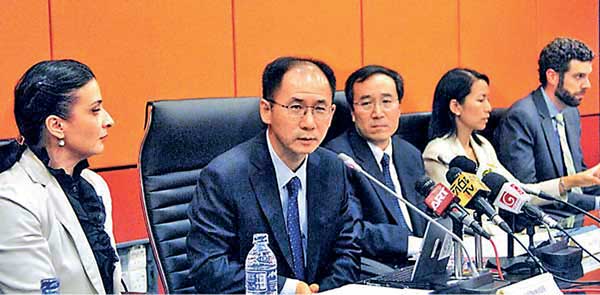Reply To:
Name - Reply Comment

IMF Mission Chief Daewoo Lee (second from left) flanked by Eteri Kvintradze (on his right) and Deputy Director for Asia Pacific Department Kenneth Kang (on his left) along with the other members of the staff team addressing the media at the Central Bank premises after concluding the two-week long first post-programme monitoring review of the Sri Lankan economy in September (File photo)
The International Monetary Fund (IMF) last week said the pace of structural reforms earlier agreed with the fund has been slower and further undue delays could derail the three-year programme between the fund and government.
The continuation of the US $ 1.5 billion programme with the IMF is dependent on the timely execution of reforms mainly linked to increasing government revenue and key structural reforms in tax administration, public financial management and governance and oversight of state-owned enterprises (SOEs).
The IMF delayed the release of the second tranche of the programme amounting to US $ 162.6 million due to the delay in implementing the promised amendment to the Value Added Tax (VAT) Bill in parliament.
“Despite showing very strong progresses on the overall fiscal management, progress in fiscal structural reforms is a bit slower than had been originally intended,” said IMF Mission Chief Jaewoo Lee from Washington, D.C., via a live teleconferencing.
Hence, the IMF cautioned against any further delays in undertaking the structural reforms, which are also critical for a sustained progress in fiscal management, could cast doubts over the continuation of the programme.
“Progress on meeting the structural benchmarks on fiscal policy, public financial management and SOEs without undue delays is critical for keeping the programme on track,” stated the IMF Staff Report submitted to the Executive Board in November.
While some of the fiscal side reforms spelt out in the budget for 2017 are on track— such as the proposed new Inland Revenue Act—the government had made limited progress in bringing in the intended reforms to the SoEs.
For months the government has been unable to find a prospective partner to run the national career, SriLankan Airlines and reforms announced for the other SoEs have met with widespread resistance from multiple stakeholders.
The employee protests, followed by violent activities at the Hambantota Port against the sale of 80 percent of the port to a Chinese party, are a case in point.
The IMF called for strong political will to continue with the reforms.
“Strong political commitment and sustained actions will be instrumental in advancing reforms,” the Staff Report added.
Despite the significant progress made in the fiscal front in the first nine months, the IMF termed the revenue proposals of the 2017 budget ambitious but expressed its optimism over their achievement.
Sri Lanka expects to increase its 2017 tax revenues by 27 percent to Rs.1.82 trillion and bring down the fiscal deficit to 4.6 percent of gross domestic product (GDP), slightly below the 4.7 percent target level set by the IMF.
“The 2017 budget announced on November 10 has been anchored on ambitious revenue growth, which can be met by implementing quality revenue measures and strengthening tax administration,” Lee said.
While the new Inland Revenue Bill is on its way for implementation, likely from March 2017, the structural reforms are crucial to maintain continuous momentum in fiscal performance.
Lee said while the fiscal performance of the first nine months has been encouraging, fiscal management going forward could become tough if the structural reforms are delayed.
“Timely progress in structural reforms is also very important, in a way for the continuing progress on the fiscal management,” he added.
Meanwhile, he commended the fiscal performance achieved during the first nine months this year, which even had outperformed the programme targets.
During the nine months to September end, Sri Lanka’s revenues increased to 9.6 percent of GDP from 8.5 percent of GDP during the corresponding period last year.
As a result, the fiscal deficit fell to 4.1 percent of the estimated GDP from the 5.1 percent of GDP in the same period last year, aptly supported by the increased tax revenues.
“Fiscal performance has been very encouraging. And as of end-September, the primary balance and tax revenues has outperformed the programme targets.
We expect the momentum to continue with the delayed implementation of the VAT Amendment, which came into effect in November,” Lee remarked.
The IMF Staff Report also said the 2016 full-year fiscal targets are within Sri Lanka’s reach.
“The 2016 primary deficit will likely fall below the end-December ceiling of Rs.97 billion (0.8 percent of GDP), with tax revenue likely exceeding the full-year target of Rs.1,428 billion (11.8 percent of GDP). Interest payments are expected to be larger than estimated by 0.4 percentage points of GDP mainly due to the upward shift in the government bond yields by around 200 basis points since March and would raise the overall deficit to around Rs.700 billion (5.7 percent of GDP),” the report stated.